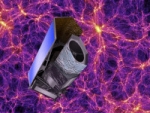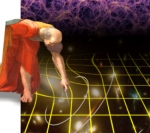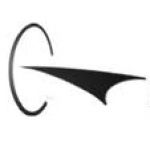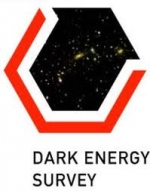Displaying items by tag: dark energy
Euclid satellite
Euclid is an ESA mission selected for launch in 2019 in the Cosmic Vision 2015-2025 programme. The main goal of Euclid is to understand the origin of the accelerating expansion of the Universe. To achieve this, it is proposed to build a satellite equipped with a 1.2 m telescope and three imaging and spectroscopic instruments working in the visible and near-infrared wavelength domains.
The primary goall is to understand the nature of dark energy and dark matter by accurate measurement of the accelerated expansion of the Universe through different independent methods.
Euclid Consortium
The Euclid Consortium (EC) is a European organisation which brings together all laboratories contributing to the Euclid mission, beside ESA. The EC is composed of the teams that imagined, designed and proposed the Euclid mission submitted to the ESA Cosmic Vision program selection.
The main objective is to probe the mysteries of dark energy and dark matter.
Euclid is an ESA medium class mission selected for launch in 2019 in the Cosmic Vision 2015-2025 programme (ESA PR selection ). The main goal of Euclid is to understand the origin of the accelerating expansion of the Universe. To achieve this, it is proposed to build a satellite equipped with a 1.2 m telescope and three imaging and spectroscopic instruments working in the visible and near-infrared wavelength domains. These instruments will explore the expansion history of the Universe and the evolution of cosmic structures with look back time by measuring shapes and redshifts of galaxies as well as the distribution of clusters of galaxies as function of redshift over a very large fraction of the sky. The satellite will be launched by a Soyuz ST-2.1B rocket and transferred to the L2 Lagrange point for a 6 years mission (see the ESA Euclid mission summary ).
Euclid will address key fundamental cosmological questions:
- Is dark energy merely a cosmological constant, as first discussed by Einstein, or is it a new kind of field that evolves dynamically with the expansion of the universe?
- Alternatively, is dark energy instead a manifestation of a break-down of General Relativity and deviations from the law of gravity?
- What are the nature and properties of dark matter?
- What are the initial conditions which seed the formation of cosmic structure?
- etc.
see as well: ESA Euclid homepage
Dark Cosmology Centre
The Dark Cosmology Centre is a research centre focusing on dark matter and dark energy. It was established by the Danish National Research Foundation (DNRF) in September 2005, as part of the Niels Bohr Institute, University of Copenhagen. It is mainly funded by the DNRF for a duration of ten years (2005-2015).
Aims
The centre objective is to gain astrophysical insight into the nature of the mysterious dark energy and dark matter. The nature of dark matter and energy is yet unkown. The existence of dark matter is inferred through its gravitational effects on ordinary, visible matter. The existence of dark energy is inferred from its effect on the expansion of the Universe.
Team
Currently (Nov. 2012) the centre consists of 40 research staff, a centre coordinator, two secretaries, an IT manager and assistant, 12 PhD students, and 9 MSc students (list here). The team members bring in key expertises and interact closely on a daily basis. In addition, DARK receives around 100 visits per year from international collaborators.
Activities
The centre focuses on research, but other activities are also important: research training, teaching, and conveying the results and methods of studying the dark Universe to the public. Increasing the number of women in science, and in particular astronomy, is also among the long-term goals of the Centre.
Dark Energy Survey (DES)
The Dark Energy Survey (DES) is designed to probe the origin of the accelerating universe and help uncover the nature of dark energy by measuring the 14-billion-year history of cosmic expansion with high precision.
More than 120 scientists from 23 institutions in the United States, Spain, the United Kingdom, Brazil, and Germany are working on the project. This collaboration is building an extremely sensitive 570-Megapixel digital camera, DECam, and will mount it on the Blanco 4-meter telescope at Cerro Tololo Inter-American Observatory high in the Chilean Andes. Starting in Sept. 2012 and continuing for five years, DES will survey a large swath of the southern sky out to vast distances in order to provide new clues to this most fundamental of questions.
The survey nature of DES is driven by its science requirements which require information about a large number of galaxies at the most distant reaches of the viewable universe. The DES will catalog the sky in a 5000 square degree area over 525 nights of viewing using the new Dark Energy Camera (DECam). It will record information on over 300 million galaxies, most so faint that their light is around 1 million times fainter than the dimmest star that can be seen with the naked eye. Some of these galaxies are so distant that the light we see from them will have left the galaxy when the universe was less than half its current age.
DES tries to answer the question: Why is the universe expansion speeding up?
WiggleZ
The WiggleZ Dark Energy Survey is a large-scale galaxy redshift survey which was carried out over 276 nights at the Anglo-Australian Telescope between Aug. 2006 and Jan. 2011.
The aim of the project is to analyze the galaxy distribution in order to learn more about the nature of dark energy.





